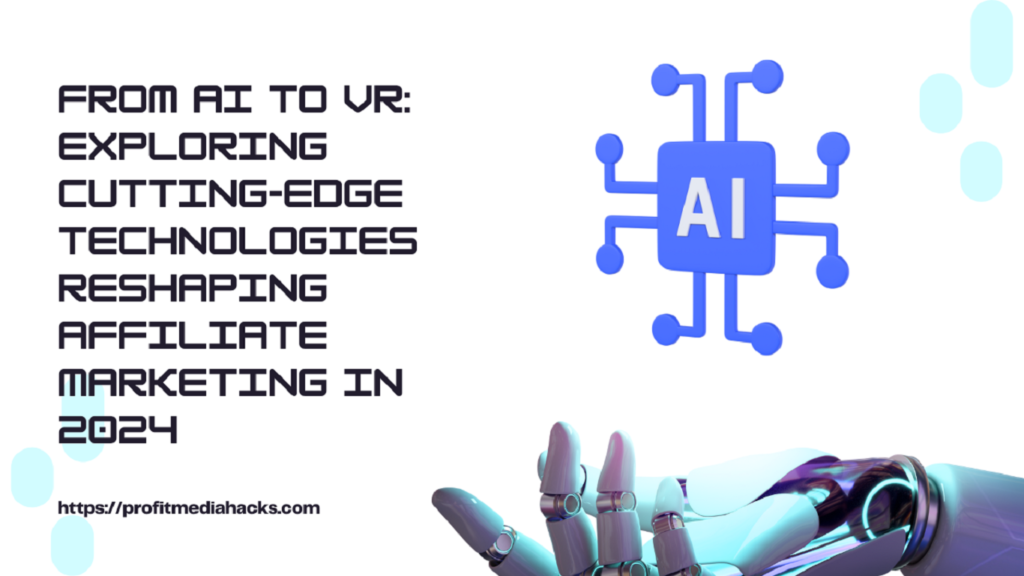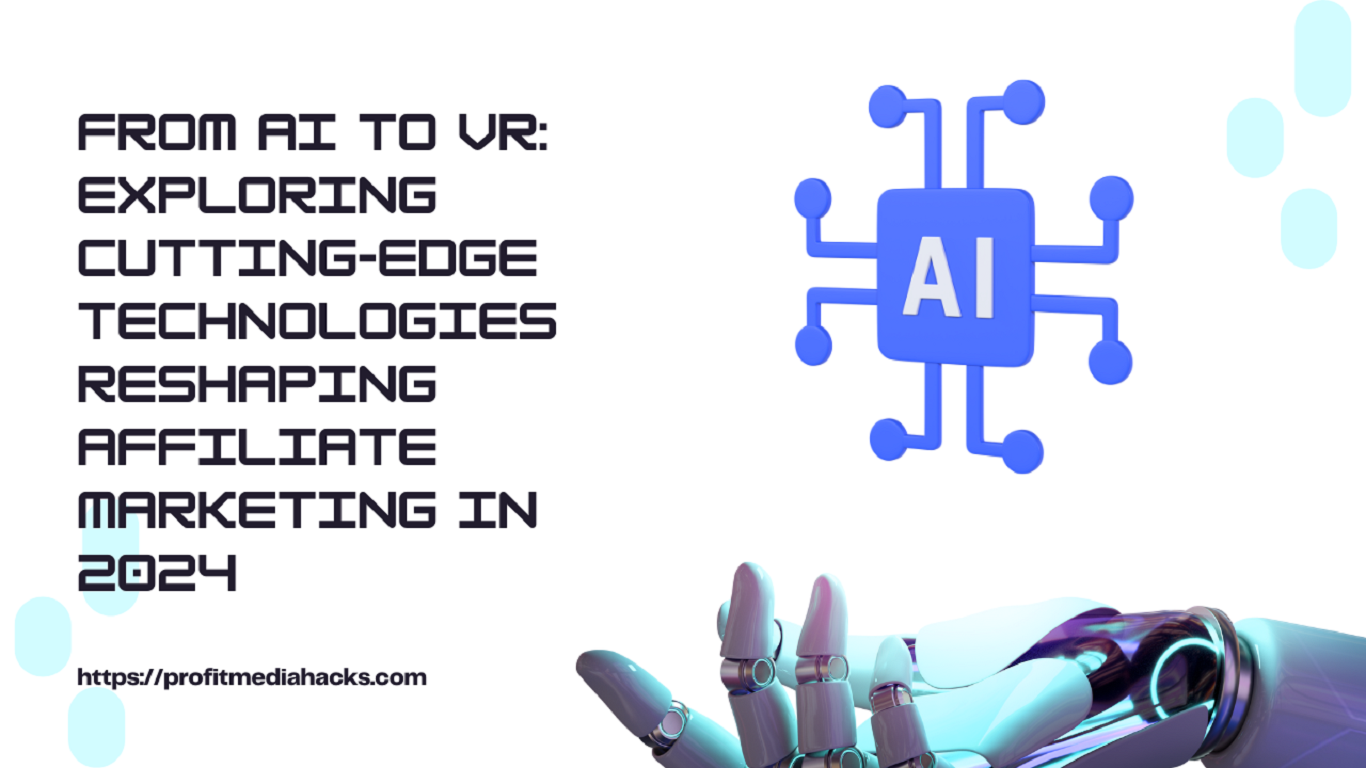Affiliate marketing, a performance-based marketing strategy where businesses reward affiliates for each customer brought by the affiliate’s marketing efforts, has witnessed a significant transformation in recent years due to technological advancements. In 2024, the convergence of artificial intelligence (AI) and virtual reality (VR) is reshaping affiliate marketing strategies, offering innovative ways to engage customers and drive sales.
Easiest & Proven Way to Make $100 Daily with 0 COST – Watch THIS FREE Training to START >>

Affiliate marketing has always been dynamic, adapting to the changing landscape of consumer behaviour and technological advancements. In essence, it involves leveraging partnerships to promote products or services, earning a commission for each sale generated through the affiliate’s promotional activities. With the rapid evolution of technology, particularly AI and VR, affiliate marketers are presented with new opportunities to enhance their strategies and maximize results.
Evolution of AI in affiliate marketing
Role of AI in personalized recommendations
The role of AI in personalized recommendations is pivotal in modern affiliate marketing strategies, fundamentally altering how businesses connect with their target audience. Through sophisticated algorithms and data analysis, AI can delve into vast troves of consumer data to discern intricate patterns and preferences. This capability allows marketers to craft tailor-made recommendations that resonate with individual interests and behaviors.
AI-driven personalized recommendations offer a multitude of benefits for both consumers and businesses. For consumers, it means a more curated and relevant shopping experience, with products and services aligned closely with their needs and desires. This level of personalization fosters a sense of connection and loyalty, enhancing the overall customer experience.
From a business standpoint, AI-powered recommendations translate into improved conversion rates and sales. By presenting consumers with products or services they are more likely to be interested in, businesses can increase the likelihood of completing a purchase. Moreover, AI enables marketers to optimize their recommendations in real-time based on user interactions and feedback, ensuring continuous refinement and effectiveness.
In essence, the role of AI in personalized recommendations transcends mere marketing tactics; it embodies a paradigm shift towards hyper-personalized and customer-centric approaches. As AI technology continues to evolve, we can anticipate even more sophisticated and nuanced recommendation systems that further elevate the efficacy and impact of affiliate marketing strategies.
AI-powered chatbots in customer engagement
AI-powered chatbots have emerged as invaluable assets in enhancing customer engagement within the realm of affiliate marketing. These sophisticated bots leverage artificial intelligence and natural language processing algorithms to interact with users in real-time, mimicking human-like conversations and providing seamless assistance throughout the customer journey.
One of the key advantages of AI-powered chatbots is their ability to offer instant support and guidance to users, regardless of the time or location. Whether it’s answering queries about products or assisting with the checkout process, these chatbots can deliver timely and relevant information, thereby streamlining the customer experience and reducing friction points.
Moreover, AI chatbots excel in personalization, tailoring their responses and recommendations based on individual preferences and past interactions. By analyzing user data and behavior, these bots can offer highly targeted suggestions, ultimately increasing the likelihood of conversion and driving sales.
Furthermore, AI chatbots contribute to improved customer satisfaction by providing consistent and reliable assistance round the clock. Whether it’s addressing common inquiries or resolving issues, these bots ensure that users receive prompt and accurate responses, fostering trust and loyalty towards the brand.
In summary, AI-powered chatbots play a pivotal role in customer engagement within affiliate marketing by offering instant support, personalized recommendations, and consistent assistance. As AI technology continues to advance, we can expect chatbots to become even more sophisticated and integral to enhancing the overall customer experience.
Impact of VR on affiliate marketing
Virtual shopping experiences
Virtual shopping experiences represent a groundbreaking innovation in affiliate marketing, revolutionizing the way consumers engage with products and brands. By leveraging virtual reality (VR) technology, affiliate marketers can create immersive and interactive environments that simulate real-world shopping scenarios, offering users a truly unique and engaging experience.
Easiest & Proven Way to Make $100 Daily with 0 COST – Watch THIS FREE Training to START >>
One of the key advantages of virtual shopping experiences is their ability to bridge the gap between online and offline retail. Unlike traditional e-commerce platforms, which rely on static images and text descriptions, VR allows users to explore products in a three-dimensional space, providing a more intuitive and immersive shopping experience. From browsing through virtual storefronts to inspecting products up close, users can interact with items in a manner that closely resembles the in-store experience.
Moreover, virtual shopping experiences offer unprecedented levels of customization and personalization. By integrating AI algorithms, marketers can tailor the shopping journey to match individual preferences and interests, presenting users with relevant products and recommendations in real-time. This level of personalization not only enhances the user experience but also increases the likelihood of conversion and repeat purchases.
Overall, virtual shopping experiences represent a paradigm shift in affiliate marketing, offering users a more immersive, interactive, and personalized shopping experience. As VR technology continues to evolve and become more accessible, we can expect to see even more innovative applications that further enhance the way consumers shop and interact with brands online.
VR-driven product demonstrations
Another area where VR is revolutionizing affiliate marketing is in product demonstrations. Instead of relying on traditional videos or images, marketers can use VR to provide interactive demonstrations of products and services. This allows customers to experience the benefits and features of a product firsthand, increasing their confidence and likelihood of making a purchase.
Integration of AI and VR in affiliate marketing
Enhanced customer targeting and engagement
By combining AI and VR technologies, affiliate marketers can create highly targeted and engaging marketing campaigns. AI algorithms can analyze customer data to identify trends and preferences, while VR experiences can captivate audiences and drive brand engagement. This synergy enables marketers to deliver hyper-personalized content through immersive VR channels, maximizing the impact of their campaigns.
Immersive advertising campaigns
AI-powered analytics can inform the creation of VR advertising campaigns that resonate with target audiences on a deeper level. Whether it’s through interactive storytelling or gamified experiences, VR ads have the potential to capture attention and leave a lasting impression on consumers. By integrating AI-driven insights into VR marketing strategies, affiliate marketers can create memorable experiences that drive conversions.
Challenges and opportunities
Privacy concerns with AI data collection
While AI offers tremendous benefits for affiliate marketing, it also raises concerns about data privacy and security. Marketers must navigate the ethical implications of collecting and utilizing consumer data, ensuring transparency and compliance with regulations such as GDPR. By prioritizing privacy and adopting responsible data practices, marketers can build trust with their audience and mitigate potential risks.
Adoption barriers for VR technology
Despite its potential, VR technology still faces adoption barriers such as high costs and technical complexity. Affiliate marketers may encounter challenges in creating VR experiences that are accessible and user-friendly across different devices and platforms. However, as VR technology becomes more affordable and user-friendly, these barriers are expected to diminish, opening up new possibilities for immersive marketing experiences.
Future trends and predictions
Advancements in AI algorithms
Easiest & Proven Way to Make $100 Daily with 0 COST – Watch THIS FREE Training to START >>
As AI continues to evolve, we can expect to see advancements in algorithms that enhance the capabilities of affiliate marketing platforms. From predictive analytics to natural language processing, AI-driven tools will become increasingly sophisticated in understanding and anticipating consumer behavior. This will enable affiliate marketers to deliver more targeted and personalized campaigns, driving higher conversion rates and ROI.
Expansion of VR applications in marketing
The proliferation of VR devices and platforms will fuel the expansion of VR applications in marketing. Beyond product demonstrations and virtual shopping experiences, we can expect to see VR used in areas such as virtual events, brand activations, and immersive storytelling. As VR technology becomes more mainstream, affiliate marketers will have unprecedented opportunities to engage with audiences in creative and impactful ways.
Conclusion
In summary, the convergence of AI and VR is transforming the landscape of affiliate marketing, offering innovative ways to engage customers and drive sales. By leveraging AI-powered personalization and immersive VR experiences, affiliate marketers can create highly targeted and engaging campaigns that resonate with their audience. While challenges such as data privacy and technology adoption remain, the future of affiliate marketing looks promising with AI and VR at the forefront of innovation.
FAQs
What is affiliate marketing? Affiliate marketing is a performance-based marketing strategy where businesses reward affiliates for each customer brought by the affiliate’s marketing efforts.
How does AI enhance affiliate marketing? AI enhances affiliate marketing by enabling personalized recommendations, powering chatbots for customer engagement, and optimizing marketing campaigns through data analysis.
What role does VR play in affiliate marketing? VR revolutionizes affiliate marketing by offering immersive shopping experiences, interactive product demonstrations, and innovative advertising campaigns.
What challenges do marketers face with AI and VR technologies? Marketers face challenges such as privacy concerns with AI data collection and adoption barriers for VR technology, including high costs and technical complexity.
What are the future trends in affiliate marketing? Future trends in affiliate marketing include advancements in AI algorithms for personalized targeting and the expansion of VR applications in marketing, offering new opportunities for engagement and conversion.
Easiest & Proven Way to Make $100 Daily with 0 COST – Watch THIS FREE Training to START >>
Thanks for reading my article on “From AI to VR: Exploring Cutting-Edge Technologies Reshaping Affiliate Marketing in 2024.”” I hope it will help!













